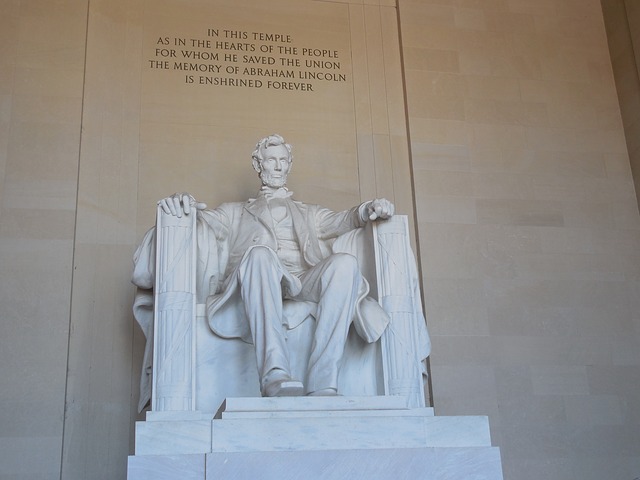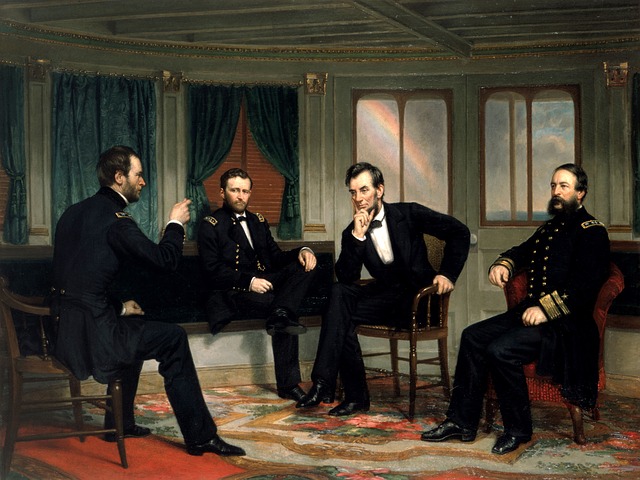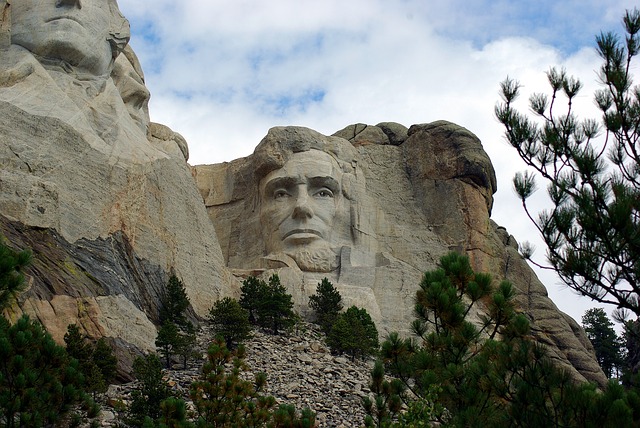Kompositorische Portraits des 20. Jahrhunderts zu Abraham Lincoln (1809–1865): Ives, Copland, Harris
Dieses Dokument enthält Unterrichtsmaterial für den fächerübergreifenden Oberstufenunterricht in Musik, Geschichte und Englisch.
Ein Arbeitsblatt zum Herunterladen finden Sie hier.
Inhalt

Daniel Chester French (Modell) und Piccirilli Brothers (Bildhauerei), Abraham Lincoln, 1920 | Marmorskulptur im Lincoln Memorial, Washington D.C. | Quelle: SeanM auf pixabay

George P.A. Healy, The Peacemakers, 1868 | Sammlung des White House, Washington D.C. | Quelle: Wikimedia

US-amerikanischer 5-Dollar-Schein | Quelle: Wikimedia

Mount Rushmore, USA | Quelle: pixabay
Politisch-historische Hintergründe
Fellow citizens, we cannot escape history.
(Abraham Lincoln, Annual Message to Congress, 1. Dezember 1862)
Im 19. Jahrhundert erlebte Nordamerika tiefgreifende soziale und gesellschaftliche Veränderungen. Der amerikanische Bürgerkrieg, auch Sezessionskrieg genannt, wurde von 1861 bis 1865 zwischen den Nord- und Südstaaten geführt. Abraham Lincoln (1809-1865) war genau in dieser Zeit Präsident der Nordstaaten und führte das Land mit dem Sieg der Nordstaaten wieder zu einer Union zusammen. Als Gegner der Sklaverei setzte er deren endgültige Abschaffung durch – ein Thema, dass die amerikanische Gesellschaft schon Jahrzehnte lang zuvor umgetrieben hatte. Außerdem legte er die Weichen für Amerikas Aufstieg zur Weltmacht, indem er eine Zentralregierung stärkte und den Industriestaat mit auf den Weg brachte. Abraham Lincolns Eltern waren Farmer, die in einer Blockhütte in Kentucky lebten, wo Lincoln aufwuchs und mithalf. Er führte also als Heranwachsender ein Leben direkt an der "Frontier", an der Grenze zur Wildnis.
He came from the prairie cabin to the capitol,
heißt es in einem Werk von Charles Ives, vertont nach einem Gedicht von Edwin Markham. Später legte Lincoln nämlich eine unglaubliche Karriere hin, vom Anwalt zum Politiker zum Präsidenten. Er starb 1865 unerwartet durch ein Attentat. Aus seiner berühmten und an sich sehr kurzen Rede anlässlich der Ehrung der Gefallenen im Bürgerkriegs, der Gettysburg Address aus dem Jahr 1863, stammt folgendes Bekenntnis zur amerikanischen Demokratie, das Aaron Copland in seinem Lincoln Portrait vertonte:
That this nation under God shall have a new birth of freedom and that government of the people, by the people, and for the people shall not perish from the earth.
(Abraham Lincoln, Gettysburg Address, 1863)
Kompositorische Portraits
Vergleichen Sie in einer Höranalyse Werke von drei amerikanischen Komponisten aus dem 20. Jahrhundert, die Abraham Lincoln als Gründervater der amerikanischen Demokratie musikalisch portraitieren:
- Charles Ives (1874 – 1954): Lincoln, the Great Commoner für Chor und Orchester (komponiert ca. 1920)
- Aaron Copland (1900 – 1990): Lincoln Portrait für Sprecher und Orchester (komponiert 1942)
- Roy Harris (1898 – 1979): Abraham Lincoln Walks at Midnight für Mezzosopran und Klaviertrio (komponiert 1953)
Charles Ives (1874-1954): Lincoln, the Great Commoner für Chor und Orchester (komponiert ca. 1920)
Charles Ives komponierte Lincoln, the Great Commoner für Chor und Orchester ca. im Jahr 1920. Als Textvorlage diente ihm ein Gedicht von Edwin Markham Lincoln, the Man of the People, das kurz zuvor im Jahr 1919 erschienen war. Ives kürzte den ursprünglichen Text allerdings für seine Komposition und wandelte ihn an mehreren Stellen etwas ab. Hier das Gedicht von Edwin Markham:
When the Norn Mother saw the Whirlwind Hour greatening and darkening as it hurried on, she left the Heaven of Heroes and came down to make a man to meet the mortal need. She took the tried clay of the common road - clay warm yet with the genial heat of Earth, dashed through it all a strain of prophecy; Tempered the heap with thrill of human tears; then mixed a laughter with the serious stuff. Into the shape she breathed a flame to light that tender, tragic, ever-changing face. Here was a man to hold against the world, a man to match the mountains and the sea. The color of the ground was in him, the red earth; the smack and tang of elemental things; the rectitude and patience of the cliff; the good-will of the rain that loves all leaves; the friendly welcome of the wayside well; the courage of the bird that dares the sea; the gladness of the wind that shakes the corn; the pity of the snow that hides all scars; the secrecy of streams that make their way beneath the mountain to the rifted rock; the tolerance and equity of light that gives as freely to the shrinking flower as to the great oak flaring to the wind - to the grave's low hill as to the Matterhorn that shoulders out the sky. Sprung from the West, he drank the valorous youth of a new world. The strength of virgin forests braced his mind, the hush of spacious prairies stilled his soul. His words were oaks in acorns; and his thoughts were roots that firmly gripped the granite truth. Up from log cabin to the Capitol, one fire was on his spirit, one resolve - to send the keen ax to the root of wrong, clearing a free way for the feet of God, the eyes of conscience testing every stroke, to make his deed the measure of a man. He built the rail-pile as he built the State, pouring his splendid strength through every blow: The grip that swung the ax in Illinois was on the pen that set a people free. So came the Captain with the mighty heart; and when the judgment thunders split the house, wrenching the rafters from their ancient rest, he held the ridgepole up, and spiked again the rafters of the Home. He held his place - held the long purpose like a growing tree - held on through blame and faltered not at praise. And when he fell in whirlwind, he went down as when a lordly cedar, green with boughs, goes down with a great shout upon the hills, and leaves a lonesome place against the sky.
(Edwin Markham, The Man of the People, 1919)
Aaron Copland, Lincoln Portrait für Sprecher und Orchester (komponiert 1942), Textpassage beginnt ab Min. 7:40
Aaron Copland wählte für Lincoln Portrait für Sprecher und Orchester (komponiert 1942) verschiedene Textausschnitte aus Reden und Ansprachen von Abraham Lincoln aus. Enthalten sind die berühmtesten Zitate des Staatsmanns – sozusagen ein "Best of Lincoln".
[…] Fellow citizens, we cannot escape history. We of this congress and this administration will be remembered in spite of ourselves. No personal significance or insignificance can spare one or another of us. The fiery trial through which we pass will light us down in honor or dishonor to the latest generation. We, even we here, hold the power and bear the responsibility. […] The dogmas of the quiet past are inadequate to the stormy present. The occasion is piled high with difficulty and we must rise with the occasion. As our case is new, so we must think anew and act anew. We must disenthrall ourselves and then we will save our country. [Annual Message to Congress, 1. Dezember, 1862] […] It is the eternal struggle between two principles, right and wrong, throughout the world. It is the same spirit that says 'you toil and work and earn bread, and I'll eat it.' No matter in what shape it comes, whether from the mouth of a king who seeks to bestride the people of his own nation, and live by the fruit of their labor, or from one race of men as an apology for enslaving another race, it is the same tyrannical principle. [Lincoln-Douglas Debates, 15. Oktober 1858] […] As I would not be a slave, so I would not be a master. This expresses my idea of democracy. Whatever differs from this, to the extent of the difference, is no democracy. [...] That from these honored dead we take increased devotion to that cause for which they gave the last full measure of devotion. That we here highly resolve that these dead shall not have died in vain. That this nation under God shall have a new birth of freedom and that government of the people, by the people, and for the people shall not perish from the earth. [Gettysburg Address, 19. November 9, 1863]
(Abraham Lincoln, Ausschnitte zitiert nach Aaron Copland, Lincoln Portrait)
Roy Harris (1898 – 1979): Abraham Lincoln Walks at Midnight für Mezzosopran und Klaviertrio (1953)
Roy Harris vertonte in Abraham Lincoln Walks at Midnight für Mezzosopran und Klaviertrio (komponiert 1953) ein Gedicht des amerikanischen Dichters Vachel Lindsay aus dem Jahr 1914, das einen nachdenklichen Blick auf Lincoln wirft:
It is portentous, and a thing of state that here at midnight, in our little town a mourning figure walks, and will not rest, near the old court-house pacing up and down. Or by his homestead, or in shadowed yards he lingers where his children used to play, or through the market, on the well-worn stones he stalks until the dawn-stars burn away. A bronzed, lank man! His suit of ancient black, a famous high top-hat and plain worn shawl make him the quaint great figure that men love, the prairie-lawyer, master of us all. He cannot sleep upon his hillside now. He is among us:—as in times before! And we who toss and lie awake for long breathe deep, and start, to see him pass the door. His head is bowed. He thinks on men and kings. Yea, when the sick world cries, how can he sleep? Too many peasants fight, they know not why, too many homesteads in black terror weep. The sins of all the war-lords burn his heart. He sees the dreadnaughts scouring every main. He carries on his shawl-wrapped shoulders now the bitterness, the folly and the pain. He cannot rest until a spirit-dawn shall come;—the shining hope of Europe free; the league of sober folk, the Workers' Earth, bringing long peace to Cornland, Alp and Sea. It breaks his heart that kings must murder still, that all his hours of travail here for men seem yet in vain. And who will bring white peace that he may sleep upon his hill again.
(Vachel Lindsay, Abraham Lincoln Walks at Midnight)
Roy Harris, Abraham Lincoln Walks at Midnight für Mezzosopran und Klaviertrio (komponiert 1953), Textpassage beginnt ab Min. 2:50
Aufgaben
- Hören Sie die drei Werke nacheinander an und notieren Sie zunächst Besonderheiten der jeweiligen Besetzung (Besetzung/Instrumentation und klangliche Besonderheiten).
- Beschäftigen Sie sich mit den englischsprachigen Texten der drei Werke. Diese Texte beleuchten den großen amerikanischen Staatsmann Abraham Lincoln aus ganz unterschiedlichen Perspektiven. Zeigen Sie inhaltliche Unterschiede und literarische Stilmittel daran auf. Ives kürzt und wandelt den ursprünglichen Gedichttext von Edwin Markham für seine Vertonung leicht ab, Copland fügt den Zitaten von Abraham Lincoln überleitende Worte bei. Überlegen Sie, warum die beiden Komponisten sich veranlasst sahen, die Originaltexte zu bearbeiten. Wie verändert sich die Wirkung der Texte dadurch?
- Beschreiben Sie die musikalischen Mittel der Vertonung in der Stimme/den Stimmen. Hören Sie die Kompositionen dazu erneut an.
- Ästhetische Erfahrung: Schildern Sie Ihren individuellen und ganz persönlichen Höreindruck!